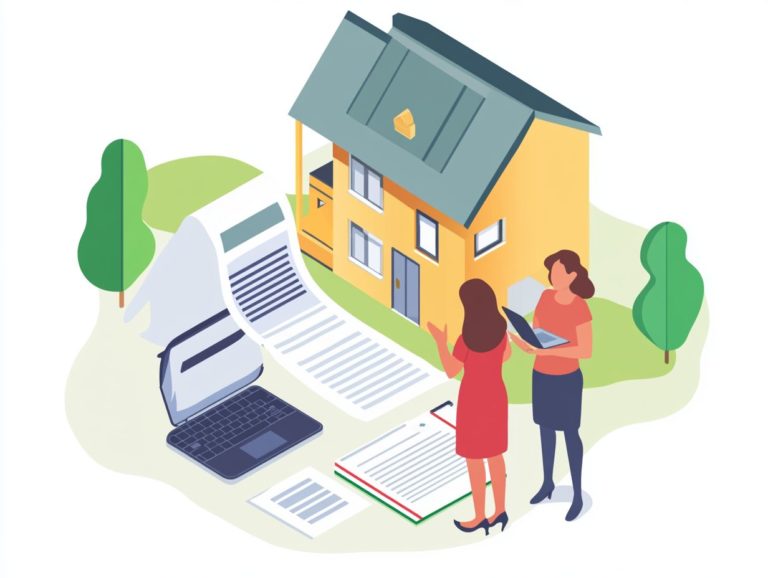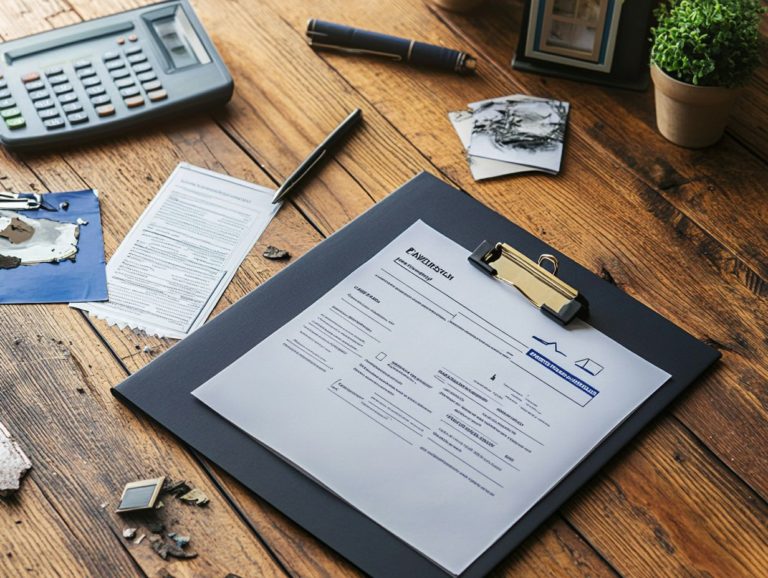The Impact of Claims on Your Home Insurance Premium
Understanding home insurance premiums might feel overwhelming, but it s vital for safeguarding your investment.
This article delves into the factors that influence your premiums, ranging from weather-related incidents to theft and liability claims. You ll also discover essential steps to take after filing a claim to ensure a seamless experience with your insurance company.
You ll also find practical tips on how to lower your premiums with preventative measures and available discounts. Prepare to equip yourself with knowledge that not only saves you money but also enhances your coverage!
Contents
- Key Takeaways:
- Understanding Home Insurance Premiums
- Types of Claims and How They Affect Premiums
- Steps to Take After Making a Claim
- Ways to Lower Your Home Insurance Premium
- Frequently Asked Questions
- What factors can impact my home insurance premium?
- How does filing a claim affect my home insurance premium?
- What types of claims have the biggest impact on my home insurance premium?
- Will my home insurance premium go up even if I didn’t file a claim?
- How long do claims stay on my insurance record?
- Is there anything I can do to reduce the impact of claims on my home insurance premium?
Key Takeaways:
Weather-related claims, such as those for hail damage or hurricanes, can significantly increase your home insurance premium. Claims for theft and vandalism can also negatively impact your premium, so it’s important to take steps to protect your home.
After making a claim, document and report it promptly and work closely with your insurance company to ensure a smooth process and potentially avoid a premium increase.
Understanding Home Insurance Premiums
Understanding home insurance premiums is essential for homeowners like you who want to protect both your property and your finances.
Several factors play a role in calculating these premiums, including your claims history, the location of your home, and the unique characteristics of your property that influence risk assessments.
Home insurance acts as a financial safety net against unforeseen events, such as theft or natural disasters. Knowing how premiums are determined empowers you to make informed decisions about coverage costs and deductible options, preparing you for whatever life may throw your way.
Factors that Affect Premiums
Key factors can significantly influence your home insurance premiums, including your claims history, the location of your home, and ways to protect your home.
For instance, maintaining a clean claims history signals to insurers that you re less likely to file future claims, potentially leading to significant discounts on your premiums.
The geographic location of your home is crucial; properties in areas prone to natural disasters like floods or wildfires often face higher risk, resulting in elevated insurance costs.
You can take proactive steps to mitigate these risks, such as:
- Installing smoke detectors
- Using fire-resistant materials
- Elevating your home in flood-prone areas
These actions may help reduce your premiums. By being aware of these factors, you can better manage your insurance costs while ensuring you have adequate coverage.
Types of Claims and How They Affect Premiums
The types of claims you make significantly influence your home insurance premiums. For instance, understanding the impact of natural disasters on home insurance can help you see how each claim can affect your premium differently, depending on its nature and frequency.
For example, liability claims, theft claims, and damage caused by natural disasters can all impact your rates based on your claims history. Understanding this dynamic helps you manage your insurance costs more effectively.
Weather-related claims are crucial in home insurance, especially for those in areas susceptible to natural disasters like hurricanes, floods, or wildfires. Understanding how these claims influence insurance premiums is vital; a history of weather-related incidents can lead to substantial cost increases over time.
For example, in states like Florida, the regular occurrence of hurricanes drives up premiums and impacts policy availability, leaving homeowners exposed to potential risks.
In California, the wildfire season exerts considerable pressure on homeowners, prompting them to invest in mitigation strategies such as fire-resistant landscaping or reinforced roofing.
By adopting proactive measures and staying informed, you can effectively protect yourself financially and fortify your property against nature’s threats.
Now that you re informed, take charge of your home insurance today!
Theft and Vandalism Claims
Theft and vandalism claims can significantly impact your home insurance premiums. Understanding what factors affect home insurance premiums is essential, as the frequency of incidents in your neighborhood plays a crucial role in determining the associated risk and coverage costs.
When you live in a high-risk area due to security concerns, you may notice a sharp increase in your insurance rates. This increase reflects the higher likelihood of claims. Don t wait consider investing in security measures such as:
- Surveillance cameras: Help monitor your property 24/7.
- Motion-sensitive lighting: Deters intruders by illuminating when movement is detected.
- Sturdy locks: Strengthens entry points to your home.
These enhancements not only help protect your property but also show insurers that you are taking proactive steps to reduce risk. Joining or forming neighborhood watch groups can further enhance community safety and may lower your insurance costs as the perceived risk decreases.
Regularly review your policy to ensure coverage matches your home’s value or any security upgrades you make.
Liability Claims
Liability claims can significantly raise your home insurance premiums, especially when they lead to considerable damage or injury. These claims can arise from various situations, like accidents on your property or dog bites.
When these incidents lead to claims, they may put your financial responsibilities under scrutiny. They can also inflate your future coverage costs. It s vital to have sufficient liability coverage to help reduce some of this risk.
By investing in preventive measures like installing security systems or enhancing safety features you may qualify for discounts. This strategy can help cushion the impact of premium increases tied to claims, making it a smart choice for homeowners.
Steps to Take After Making a Claim
After you make a claim on your home insurance, it’s vital to act quickly and follow certain steps to ensure a smooth process.
Start by carefully writing down the damage, then report it effectively to your insurance company. This approach will help you navigate the claims process with confidence.
Documenting and Reporting the Claim
Accurate documentation and reporting of a claim are crucial in the home insurance process, as they significantly influence both the outcome and your claims history.
The first step involves thoroughly assessing and listing all damages. Take clear photographs from multiple angles to provide compelling visual evidence. Organize the damages by how serious they are and what type they are, whether structural issues, personal property, or miscellaneous items.
When you report the claim, include specific details such as dates, estimated repair costs, and any communications with contractors or insurance representatives. Keeping organized records both physical and digital ensures you have easy access to this information whenever necessary.
This careful approach not only helps expedite the claims process but also plays a critical role in preventing disputes over claims. These disputes can ultimately impact your future insurance premiums and coverage eligibility.
Working with Your Insurance Company
Working effectively with your insurance company after making a claim is essential for achieving a favorable resolution and can significantly impact your overall claims history.
You should prioritize clear communication by thoroughly understanding your policy’s coverage types. This knowledge enables you to ask the right questions.
When reviewing the terms, leverage your insurance provider’s expertise to clarify any misconceptions about coverage limits and exclusions. The claims adjuster is the person who evaluates your claim and determines how much your insurance company will pay.
While navigating the claims process may seem daunting, keeping organized records like photographs and receipts can streamline the interaction.
Establishing a rapport with the claims adjuster can create a smoother discussion environment. Being polite and responsive not only fosters goodwill but may also help reduce potential future increases in your premiums.
Ways to Lower Your Home Insurance Premium
Homeowners have the opportunity to adopt a range of proactive measures to lower their home insurance premiums.
By implementing effective risk management strategies and exploring discounts available from insurance providers, you can significantly enhance your financial efficiency. Start implementing these strategies today to save money on your insurance!
Preventative Measures and Discounts
Taking preventive steps can lead to significant discounts on your home insurance premiums. This strategy is crucial for any homeowner.
By prioritizing security think cutting-edge alarms and comprehensive monitoring systems you can greatly reduce the risks of theft or damage.
Upgrading construction materials, like reinforced doors and impact-resistant windows, enhances your property’s resilience against natural disasters.
Taking these steps creates a safer living environment and shows insurance providers that you present a lower risk.
Many homeowners are thrilled to find that their insurance costs decrease, offering both financial relief and peace of mind, knowing their investments are safeguarded.
Frequently Asked Questions
The cost of your home insurance premium is determined by various factors such as the location of your home, its age, the insurance coverage you choose, and your claims history.
Filing a claim can potentially increase your home insurance premium, as it indicates to the insurance company that your home is at a higher risk for future claims. To navigate this aspect effectively, it’s beneficial to have a solid grasp of understanding the claims process for home insurance.
Claims related to water damage, fire damage, and theft can significantly impact your home insurance premium, as outlined in the impact of your credit score on home insurance.
Yes, your home insurance premium can still increase even if you did not file a claim. This can be due to factors like inflation, changes in your coverage, or an increase in the overall cost of insurance in your area.
How long do claims stay on my insurance record?
Claims can stay on your insurance record for up to 7 years. Even if you switch insurance companies, the new insurer will have access to your previous claims history.
To reduce the impact of claims on your home insurance premium, consider raising your deductible (the amount you pay out of pocket before insurance kicks in), maintaining a good credit score, and implementing measures to prevent future claims, such as installing a security system or updating your home’s plumbing and electrical systems.



